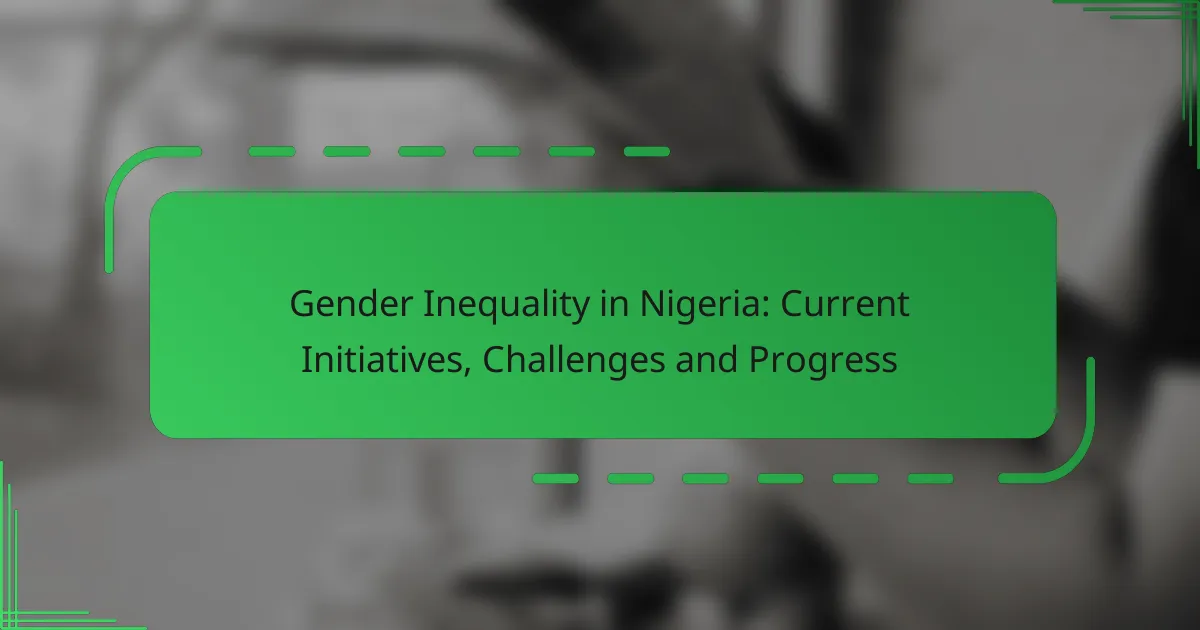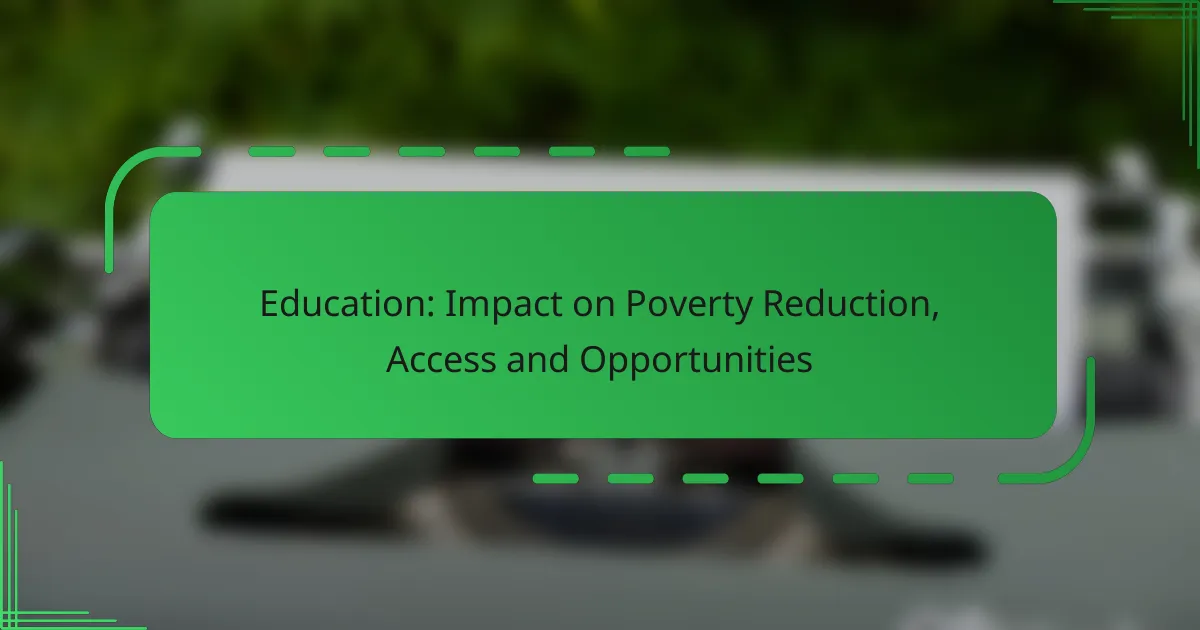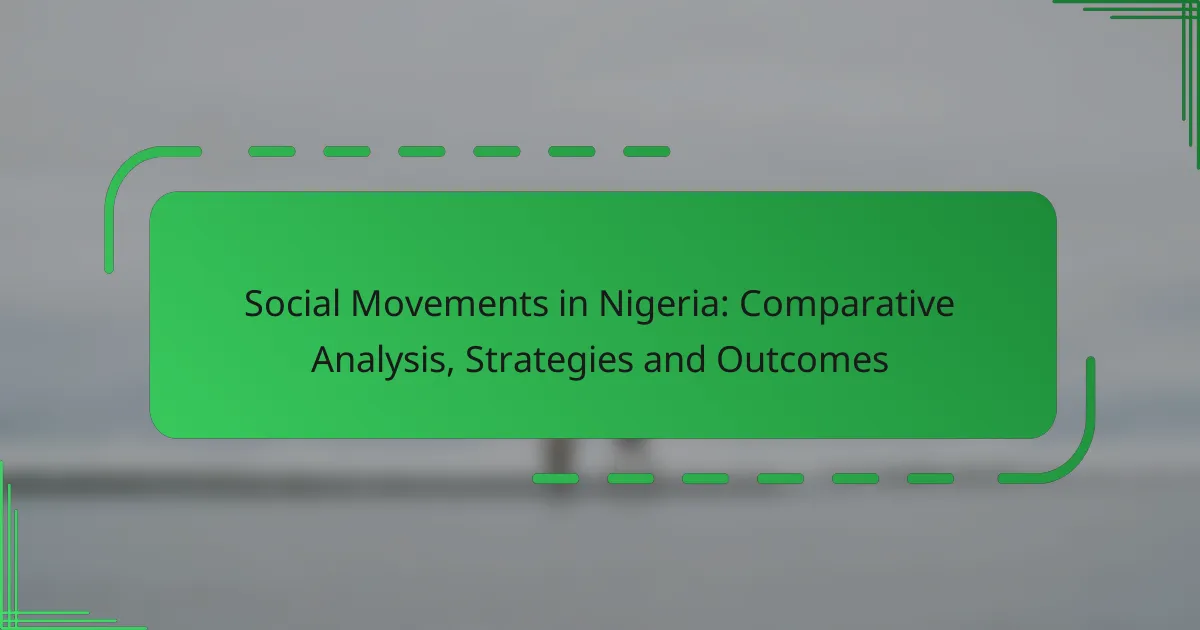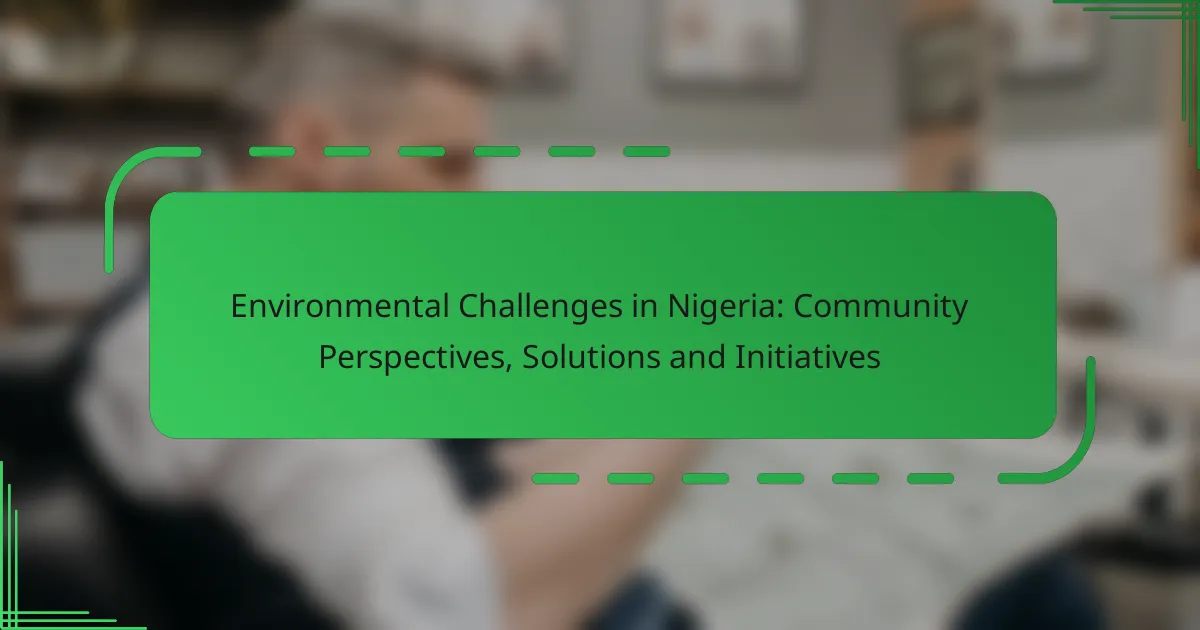Gender inequality in Nigeria remains a pressing issue, despite ongoing initiatives aimed at empowering women and promoting equal opportunities. While there have been gradual improvements in areas like education and political representation, significant challenges such as cultural barriers, economic disparities, and inadequate legal protections continue to impede progress for women and girls across the country.
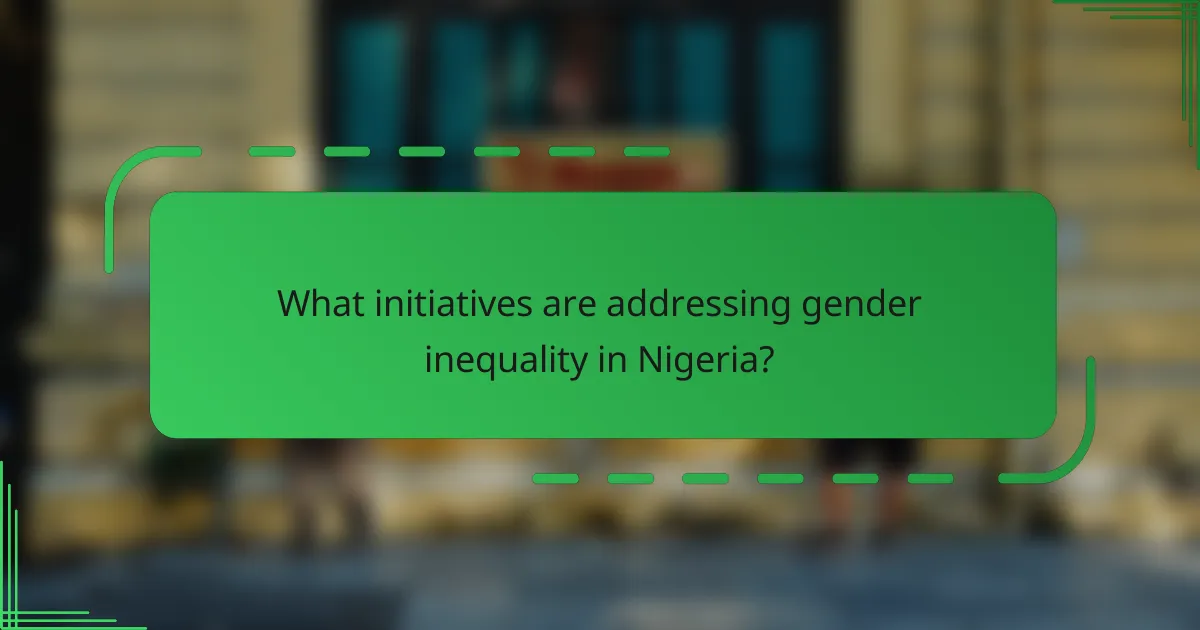
What initiatives are addressing gender inequality in Nigeria?
Various initiatives are actively tackling gender inequality in Nigeria, focusing on empowering women and promoting equal opportunities. These programs aim to address systemic barriers and enhance the status of women and girls across the country.
Women Empowerment Programme
The Women Empowerment Programme in Nigeria is designed to enhance the economic and social status of women. It provides skills training, access to microfinance, and support for entrepreneurship, enabling women to become financially independent.
Participants often receive training in areas such as tailoring, food processing, and crafts, which can lead to sustainable income sources. This initiative has seen thousands of women gain skills that improve their livelihoods and contribute to their communities.
Girl Child Education Initiative
The Girl Child Education Initiative focuses on increasing school enrollment and retention rates for girls in Nigeria. It addresses cultural and economic barriers that prevent girls from accessing education, such as early marriage and poverty.
Through scholarships, community awareness campaigns, and partnerships with local schools, this initiative aims to ensure that girls receive quality education. Educated girls are more likely to pursue higher education and improve their future prospects.
National Gender Policy
The National Gender Policy outlines the Nigerian government’s commitment to promoting gender equality and empowering women. It provides a framework for integrating gender considerations into national development plans and policies.
This policy emphasizes the need for gender-sensitive budgeting and the establishment of mechanisms to monitor progress. It aims to create an enabling environment for women’s participation in decision-making processes at all levels.
UN Women Collaborations
UN Women collaborates with the Nigerian government and local organizations to advance gender equality initiatives. These partnerships focus on enhancing women’s rights, economic empowerment, and leadership opportunities.
Programs supported by UN Women often include capacity-building workshops and advocacy campaigns aimed at changing societal attitudes towards gender roles. Their efforts have led to increased visibility of women’s issues in national discourse.
Local NGO Efforts
Numerous local NGOs are dedicated to addressing gender inequality in Nigeria through grassroots initiatives. These organizations often provide direct support to women and girls, focusing on health, education, and legal rights.
Examples include initiatives that offer legal aid to women facing domestic violence and programs that promote reproductive health education. Local NGOs play a crucial role in mobilizing communities and fostering a culture of gender equality.
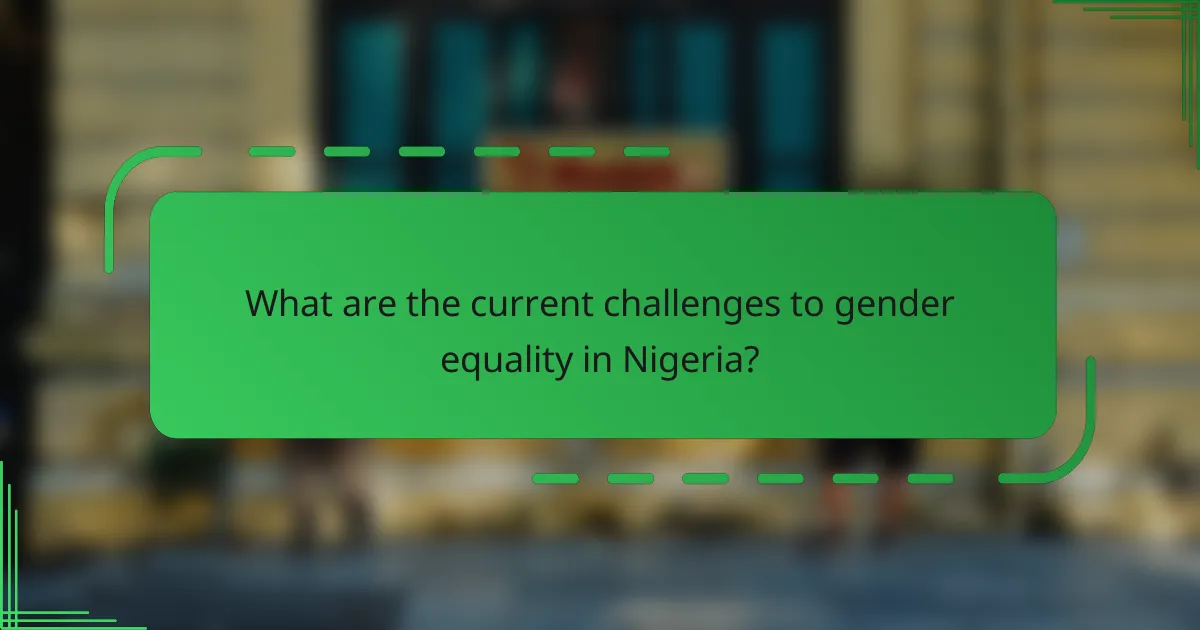
What are the current challenges to gender equality in Nigeria?
Gender equality in Nigeria faces significant challenges that hinder progress. These include cultural barriers, economic disparities, lack of legal protections, and limited access to education, all of which contribute to the ongoing inequality experienced by women and girls.
Cultural Barriers
Cultural norms in Nigeria often prioritize traditional gender roles, which can limit women’s opportunities and rights. Many communities uphold beliefs that women should primarily focus on domestic responsibilities, restricting their participation in public life and decision-making processes.
These cultural attitudes can lead to discrimination and violence against women, making it difficult for them to assert their rights. Addressing these deep-rooted beliefs requires community engagement and education to promote gender equality as a shared value.
Economic Disparities
Economic inequality is a major challenge to gender equality in Nigeria, with women often facing barriers to employment and financial independence. Women are frequently underrepresented in the formal workforce and are more likely to work in low-paying, informal jobs.
Access to financial resources, such as credit and land ownership, is also limited for women, which hinders their ability to start businesses or invest in their futures. Initiatives aimed at providing women with financial literacy and access to funding can help bridge this gap.
Lack of Legal Protections
Despite some legal frameworks aimed at protecting women’s rights, enforcement remains weak in Nigeria. Many laws that support gender equality are not effectively implemented, leaving women vulnerable to discrimination and violence.
For instance, laws against domestic violence and sexual harassment often lack the necessary support systems for victims. Strengthening legal protections and ensuring accountability for violations are crucial steps toward achieving gender equality.
Limited Access to Education
Access to education for girls in Nigeria is still a significant challenge, particularly in rural areas where cultural and economic factors can impede enrollment. Many families prioritize boys’ education over girls’, believing that investing in sons will yield better returns.
Efforts to improve girls’ education include scholarship programs and community awareness campaigns that highlight the importance of educating girls. Ensuring that girls have equal access to quality education is essential for empowering them and promoting gender equality in the long term.
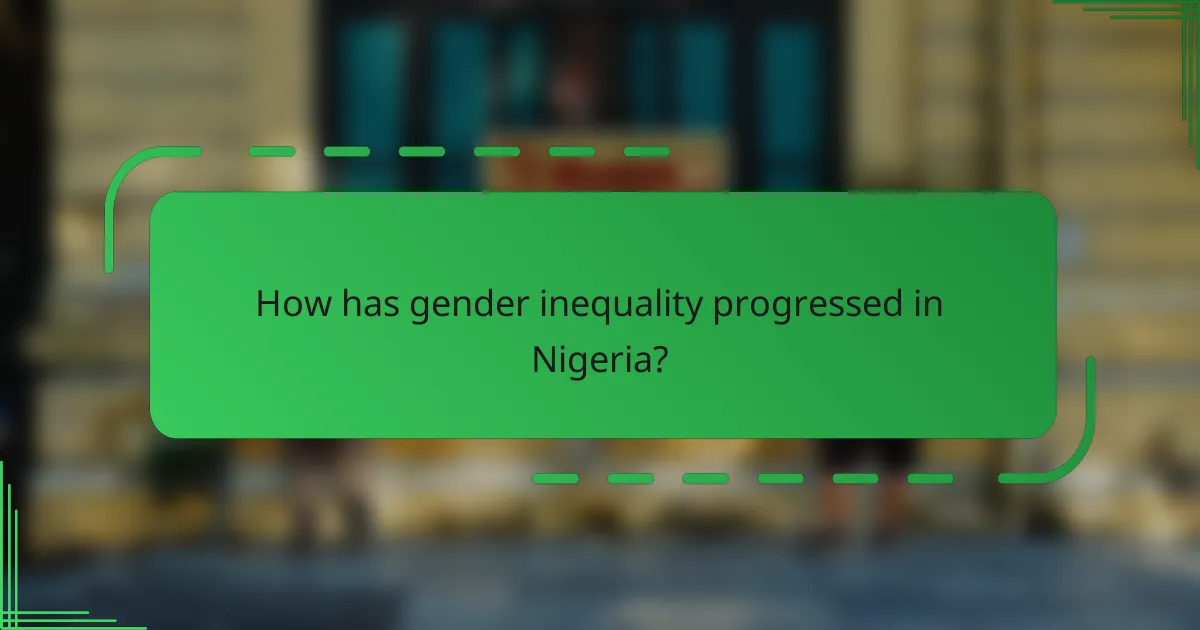
How has gender inequality progressed in Nigeria?
Gender inequality in Nigeria has seen gradual improvements, particularly in areas such as education and political representation. However, significant challenges remain, including cultural barriers and economic disparities that continue to hinder progress.
Statistical Improvements
Recent data indicates that female enrollment in primary and secondary education has increased, with some regions reporting near parity with male students. Additionally, women’s participation in the workforce has risen, although it still lags behind men, with estimates suggesting that women make up around 40-50% of the labor force in various sectors.
Health indicators have also improved, with maternal mortality rates declining in urban areas due to better access to healthcare services. However, rural regions still face high rates, highlighting the need for targeted interventions.
Increased Female Representation
There has been a notable rise in female representation in political offices, with women holding approximately 20-30% of seats in local and state governments. Initiatives such as the Gender and Equal Opportunities Bill aim to further enhance women’s political participation.
Moreover, organizations are actively promoting female leadership through mentorship programs and training workshops, which have empowered many women to take on leadership roles in their communities.
Success Stories from Local Communities
In various local communities, grassroots initiatives have successfully addressed gender inequality by promoting women’s rights and economic empowerment. For instance, cooperatives have been established that focus on women’s entrepreneurship, allowing them to access microloans and training.
Additionally, community-based organizations have launched awareness campaigns that educate both men and women about the importance of gender equality, leading to cultural shifts in attitudes towards women’s roles in society.
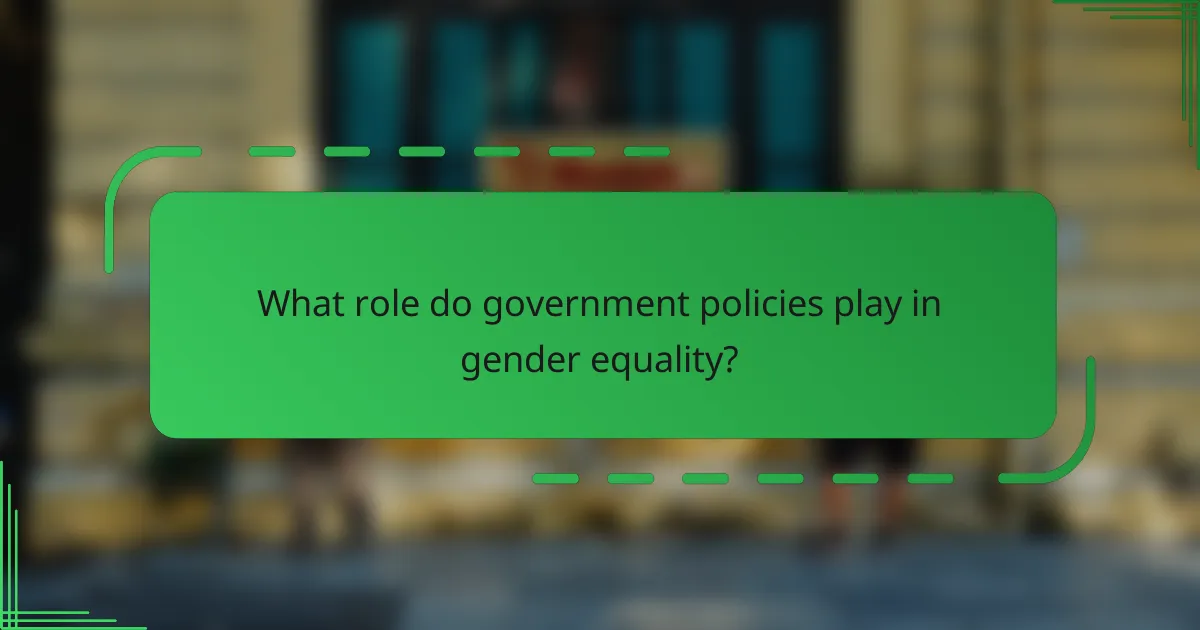
What role do government policies play in gender equality?
Government policies are crucial in promoting gender equality by establishing frameworks that support women’s rights and address systemic inequalities. These policies can create legal protections, promote equal opportunities, and allocate resources to initiatives aimed at empowering women in Nigeria.
Implementation of Gender Policies
The effective implementation of gender policies in Nigeria involves translating laws and regulations into actionable programs. This includes ensuring that local governments are equipped to enforce policies that promote women’s participation in education, healthcare, and the workforce. Regular monitoring and evaluation are necessary to assess the impact of these policies on gender equality.
Challenges in implementation often arise from bureaucratic inefficiencies and lack of awareness among the populace. Engaging community leaders and organizations can enhance the reach and effectiveness of these policies.
Funding for Gender Initiatives
Funding is essential for the success of gender initiatives in Nigeria, as it allows for the development and sustainability of programs aimed at reducing gender disparities. Government budgets should allocate a specific percentage to gender-focused projects, which can include education, health services, and economic empowerment programs for women.
In addition to government funding, partnerships with private sector entities and international donors can provide additional financial resources. Establishing transparent funding mechanisms can help ensure that resources are used effectively and reach the intended beneficiaries.
Collaboration with International Organizations
Collaboration with international organizations plays a significant role in advancing gender equality in Nigeria. These partnerships can bring in expertise, funding, and best practices from around the world, enhancing local efforts to promote women’s rights. Organizations such as UN Women and the World Bank often provide technical assistance and capacity-building support.
Such collaborations can also help Nigeria align its gender policies with global standards and commitments, such as the Sustainable Development Goals. However, it is crucial to ensure that these partnerships are culturally sensitive and tailored to the specific needs of Nigerian women.
